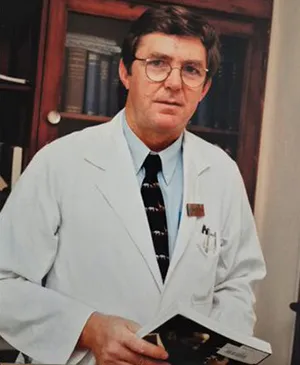Dr Seamus O’Dea, who carried out vital services for patients with rabies, botulism and diphtheria on national level for several years, retired in July
The process of transferring services for treating rabies, botulism and diphtheria to health regions poses risks for potential gaps that may lead to vulnerable patients being missed, the HSE’s chief clinical officer has said.
In a letter sent to executive officers and clinical directors across the HSE regions last month, Dr Colm Henry said there were ongoing discussions around how these services will be carried out at a local level, after the retirement of a Dublin-based clinician who had treated patients with these conditions for several years.
“There are risks, while these discussions are taking place, of gaps in service, and therefore potential for a person with a rabies-prone exposure being missed, lost to follow-up or inappropriately managed,” Dr Henry said.

Dr Seamus O’Dea, Senior Medical Officer (Retired) at Cherry Orchard Hospital
On July 4, the retirement of Dr Seamus O’Dea, Senior Medical Officer at Cherry Orchard Hospital, meant that a service he delivered, which was responsible for the assessment of patients and delivery of critical biologics used for acute post-exposure treatment/prophylaxis for rabies, botulism and diphtheria, ceased to operate.
In a letter dated July 3, Dr Henry said: “While this service had never been commissioned as a national service, it had, in effect, provided advice and treatment on management of potentially or actually exposed patients for many years from all over the country.
“Recognising the importance of this service, the National Health Protection Office (NHPO) through a Task and Finish Group, has been working with key partners and stakeholders at national and regional level to support implementation of a new regional service model.”
Dr Henry said that consensus had been reached on the role of EDs in how it will assess new presentations of rabies, botulism and diphtheria. Regional public health teams will also support clinical colleagues in undertaking risk management and managing any wider community risks. A new generic care pathway for rabies, the most impactful in terms of demands for care and assessment, has also been developed by NHPO.
However, the letter outlined a number of issues still up for discussion. This includes the regional provision of on-call services for infectious diseases for weekends and bank holidays, with none currently available outside of Dublin’s Mater hospital.
Agreement on a single regional designated centre has also not been reached. The role of primary care is up for debate, as, according to the letter, the Irish College of GPs have requested ‘that GPs should not be included in the pathway initially as there is currently no mechanism for them to be paid for this extra service.’
The process has raised concerns that vital medications will not be immediately available in urgent cases, with healthcare providers unsure where to source treatments while the transfer of services is underway.
As reported last week, Ireland’s Health Products Regulatory Authority is closely monitoring the potential use of unlicensed Botox-like products here after health officials in the UK were notified of people suffering from iatrogenic botulism linked to cosmetic procedures.
This week the Health Protection and Surveillance Centre (HPSC) published guidelines on the process for ordering antitoxin medications for botulism and diphtheria.
While the National Cold Chain Service can be contacted regarding orders during normal business hours, out-of-hours queries will be dealt with by regional public health teams.
Orders out-of-hours are mediated through an on-call consultant at the National Health Protection Office who can arrange emergency delivery.
In a statement issued to Irish Medical Times, a HSE spokesperson said that the transfer of this service to the regions will ‘better meet the needs of local populations and build a resilient national service’.
They said that implementation groups have been established regionally enact a new care pathway developed by a national working group, and the existence of both teams will ‘mitigate any risk relating to access to assessment and care for patients, potentially created by the standing down of a previously available service, which had been in place for many years.’
The spokesperson added: “The HSE maintains a national stock of rabies vaccine and immunoglobulin for post-exposure prophylaxis, in line with national guidelines, and stocks for this purpose remain available.”










